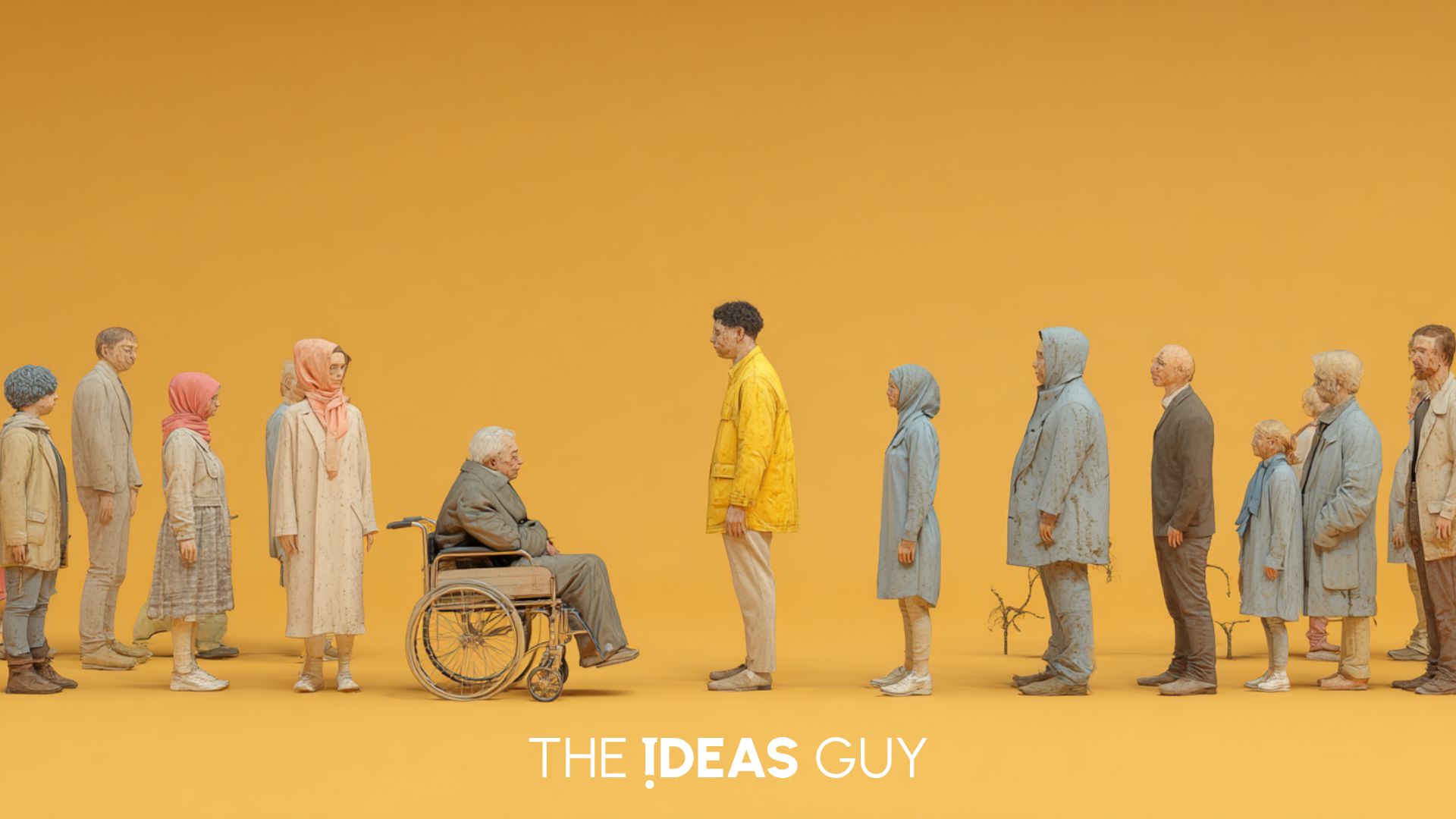My barber (yes I do go to one who does the whole hot towel, beard trim, nose wax shebang!) knows more about human psychology than most therapists I've met. Not because he's studied Freud or Jung, but because for around twenty years in both Kurdistan and England, he's listened to people talk when they think they're just getting a haircut. I am not sure if he can spot a marriage in trouble from how someone sits in the chair but he knows which customers are lying about being "fine" and which ones genuinely are. He's probably developed theories about confidence, anxiety, and social masks that would make academics weep with envy!
Yet if he walked into a psychology conference, security would probably escort him out. If he applied for a counselling role, his CV wouldn't make it past the first screen. His decades of human observation, his intuitive understanding of emotional patterns, his practical wisdom about what actually helps people feel better about themselves – none of it counts because it lacks the proper credentials.
We've created a world where learning has been professionalised, credentialised, and safely contained within approved channels. Knowledge flows down hierarchies from qualified experts to grateful recipients. Wisdom belongs to those with letters after their names. Everyone else is just... everyone else.
This is bollocks of the highest order.
The Credential Trap
We've built a peculiar fiction in modern Britain: that wisdom correlates with qualifications, that insight increases with seniority, that the person with the most letters after their name necessarily knows the most about any given subject. It's a comforting myth because it suggests the world is organised sensibly, with knowledge flowing tidily from those who've earned the right to know to those who haven't.

The reality is messier and more interesting. Walk into any organisation and you'll find that the people actually doing the work often understand it far better than those managing it. They see the daily friction points, the workarounds nobody talks about, the gaps between policy and practice that official reports somehow miss.
Take the NHS, that great British institution we (or maybe just ‘I’) love to both celebrate and complain about. The consultants writing protocols rarely witness the 3am chaos that night shift nurses navigate with remarkable ingenuity. The administrators designing patient flow systems don't see what the porters know about which routes actually work when time matters. The executives debating staffing models haven't absorbed the cleaners' understanding of how infection really spreads through a ward.
Yet when problems arise, we convene committees of the credentialed rather than asking the people who encounter the problems daily. We assume that formal training trumps lived experience, that theoretical knowledge beats practical wisdom. This isn't just organisationally stupid; it's a form of intellectual snobbery that costs us dearly.
The credential trap works both ways. Those with qualifications learn to dismiss insights from the uncredentialed, while those without formal training learn to keep their observations to themselves. The warehouse operative who's spotted a pattern in supply chain failures doesn't speak up because "that's not my job." The teaching assistant who's identified why certain children struggle stays quiet because they're "just" a TA. The receptionist who understands customer behaviour better than the marketing team keeps their insights to their little friendship group on the front desk.
This creates what organisational theorist Chris Argyris called "skilled incompetence" – the ability to produce the outcomes we say we want while remaining oblivious to the knowledge that could help us do it better. We become skilfully incompetent at learning from the people best positioned to teach us.
“Smart people don't learn... because they have too much invested in proving what they know and avoiding being seen as not knowing.” Chris Argyris
The most damaging aspect of credentialism isn't that it's unfair, though it often is. It's that it's wasteful. We're surrounded by intelligence, observation, and insight that we systematically ignore because it comes wrapped in the wrong packaging. We've created hierarchies of knowing that bear little relationship to hierarchies of actual knowledge.
The Invisible Curriculum
Every organisation runs on two curricula: the official one documented in handbooks and procedures, and the invisible one that actually determines how things get done. The invisible curriculum is taught by people who don't appear on organisational charts as teachers but who possess the most valuable knowledge about how systems really work.

The school receptionist knows more about child safeguarding than many designated safeguarding leads. She's the one who notices when a usually chatty parent starts avoiding eye contact, when a normally well-dressed child arrives consistently unkempt, when the pickup routine changes without explanation. She's developed an intuitive sense of family dynamics from thousands of brief interactions that formal training struggles to replicate.
But her insights rarely make it into safeguarding reviews or policy discussions. She's not invited to the meetings where protocols are debated. Her observations are dismissed as "gossip" rather than recognised as intelligence. Meanwhile, committees of qualified professionals debate abstract scenarios while missing the concrete signs happening right in front of them.
The night cleaner at the hospital has watched more deaths than most doctors. She's seen how families really behave in crisis, what actually comforts people in their final moments, which words help and which ones hurt. She's absorbed lessons about dignity, grief, and human resilience that medical school doesn't teach. Yet her understanding of patient care is invisible to the system that employs her.
British politeness makes this worse. We're trained not to speak out of turn, not to overstep our stations. The dinner lady who's noticed patterns in children's behaviour that escape educational psychologists keeps quiet because "it's not her place." The postman who understands neighbourhood dynamics better than community development officers doesn't offer his insights because he's just delivering mail.
This invisible curriculum exists everywhere. The taxi driver who knows which parts of the city are genuinely dangerous versus which ones just have bad reputations. The bookshop assistant who can predict reading trends six months before market research catches up. The call centre worker who understands customer frustration patterns better than the executives designing customer experience strategies.
These people aren't just doing their jobs; they're unconsciously conducting longitudinal studies in human behaviour, social patterns, and system failures. They're generating insights that formal researchers would kill for. But because their laboratories are taxi cabs and shop floors rather than universities, their findings never see daylight.
Learning Uphill
Traditional learning models assume knowledge flows downhill – from senior to junior, qualified to unqualified, expert to novice. But some of the most valuable learning happens when we reverse this flow, when we learn to listen uphill to voices we've been trained to ignore.

During the pandemic, it wasn't epidemiologists who first spotted that COVID spread differently in different communities. It was the community health workers, the local councillors, the faith leaders who noticed that official guidance wasn't landing as intended. They saw the cultural and practical barriers that formal public health training hadn't anticipated. Yet their insights took months to percolate up to policy level.
The same pattern repeats across sectors. Technology executives debate digital inclusion while delivery drivers understand better than anyone which areas lack reliable internet and why. Urban planners design cycle lanes while the actual cyclists; not the middle-class weekend riders they imagine, but the people cycling because they can't afford cars - remain unheard.
This uphill learning requires what anthropologist James Scott called "practical wisdom" - the kind of knowledge that emerges from daily engagement with complex systems rather than abstract study of them. Scott observed that centralised authorities often fail because they can't access the distributed intelligence of people actually living within the systems they're trying to manage.
“The world of rumour and gossip is like a privileged world with which a social scientist or an anthropologist can take the temperature of popular aspirations.” James Scott
The psychological barrier to uphill learning runs deep. Status anxiety prevents us from admitting that someone ‘beneath’ us might know something we don't. Professional identity makes it threatening to acknowledge that formal training might have blind spots. The investment we've made in our expertise creates cognitive sunk costs that resist contradictory evidence.
But uphill learning isn't about abandoning expertise or pretending all knowledge is equal. It's about recognising that intelligence distributes differently than authority, that insight emerges from unexpected corners, that the person closest to a problem often sees it most clearly regardless of their formal qualifications.
The Democracy of Insight
The most profound insights often come from the periphery rather than the centre. People outside established systems see what insiders cannot. They notice assumptions that have become invisible, patterns that expertise has taught us to ignore, solutions that conventional wisdom declares impossible.
Fresh eyes aren't just valuable in creative fields; they're essential everywhere. The management consultant who's never worked in education might spot inefficiencies that teachers can't see because they're too embedded in the system. The immigrant who's navigating British bureaucracy for the first time notices complexities that natives take for granted. The temporary worker who moves between departments sees connections that permanent staff miss.
This peripheral vision works because distance creates clarity. When you're not invested in existing ways of doing things, when you haven't learned what's "supposed" to be impossible, when you haven't absorbed the tribal knowledge about why things can't change, you ask different questions.

The sociologist Georg Simmel wrote about "the stranger" as someone who brings both nearness and distance to social situations. Strangers can observe patterns that insiders can't see precisely because they're simultaneously inside and outside the system. They have access without attachment, proximity without prejudice.
“The Stranger is close to us, insofar as we feel between him and ourselves common features of a national, social, occupational, or generally human, nature. He is far from us, insofar as these common features extend beyond him or us, and connect us only because they connect a great many people.” Georg Simmel
Every organisation needs its strangers – people who can see clearly because they're not blinded by familiarity. But we systematically exclude these voices in favour of "cultural fit" and "relevant experience." We prize insiders who know how things work over outsiders who might question whether they should work that way at all.
The democratic insight doesn't mean all opinions are equally valid or that experience doesn't matter. It means that valuable perspectives can emerge from anywhere, that intelligence isn't contained by credentials, that the most important questions might come from the most unexpected sources.
Practical Frameworks for Learning from Everyone
Recognising the value of distributed intelligence is one thing; actually accessing it is another. How do we create systems that capture insights from unexpected sources without being patronising or tokenistic?
First, we need to abandon the performance of consultation - those box-ticking exercises where we ask for input without any real intention of listening. Genuine consultation requires what philosopher Paul Ricoeur called "interpretive charity" – the assumption that other people's perspectives contain valuable truths even when they conflict with our own.
This means designing conversations rather than presentations. Instead of explaining our solutions and asking for feedback, we start with problems and invite insight. Instead of asking "What do you think of our new policy?" we ask "What problems are you trying to solve in your daily work?" The difference is subtle but profound.
Second, we need to recognise that valuable insights often come disguised as complaints, workarounds, or informal practices. The customer service representative who's developed an unauthorised way of handling difficult calls might have cracked a problem that official procedures miss. The teacher who consistently ignores policy guidelines might have discovered something important about how children actually learn.
Rather than stamping out these deviations, smart organisations study them. They ask not "Why aren't you following procedure?" but "What are you trying to achieve that the procedure doesn't address?" They treat informal innovation as intelligence rather than insubordination.
Third, we need to create what the military calls "after action reviews" but apply them more broadly. These are structured debriefs where everyone involved in an activity can share what they observed, what worked, what didn't, and what they'd change. The key is that everyone means everyone - not just the people in charge.

The power of these reviews isn't just in capturing lessons learned; it's in legitimising observation as a valuable contribution regardless of role or rank. When the junior person's insights are treated with the same seriousness as the senior person's strategy, learning becomes democratic rather than hierarchical.
Fourth, we need to get comfortable with productive discomfort - a term popularised by psychiatrist Scott Peck. This is the awkwardness of having our assumptions challenged by people we didn't expect to challenge them. When the apprentice questions a fundamental process, when the part-time worker suggests a better way of organising things, when the newest team member points out something obvious that everyone else has stopped seeing - these moments feel uncomfortable precisely because they're valuable.
The Resistance to Learning Democratically
Why don't we naturally learn from everyone? The barriers aren't just organisational; they're psychological and cultural. British society, for all its supposed egalitarianism, and perhaps many other societies, remains deeply stratified. We've internalised hierarchies of worth that make it difficult to imagine that wisdom might emerge from unexpected places.
Class remains the elephant in the room. Middle-class professionals struggle to acknowledge that working-class people might understand systems better than they do. The assumption that education equals intelligence runs so deep that we can barely see it, let alone question it. We've confused credentials with capability so thoroughly that departing from this view feels almost immoral.

There's also Festinger’s ideas about cognitive dissonance that we have mentioned previously - the discomfort we feel when new information conflicts with existing beliefs. If someone without formal training knows something we don't, it threatens our professional identity. If solutions exist that we missed despite our expertise, it challenges our self-concept. The psychological cost of admitting we might learn from "below" can feel too high.
Status anxiety makes this worse. In a competitive professional environment, acknowledging that others might have insights we lack feels like weakness. We've created cultures where not knowing something is shameful rather than normal, where learning from unexpected sources suggests incompetence rather than wisdom.
The pace of modern work compounds the problem. Learning from everyone requires patience, curiosity, and genuine conversation – luxuries that busy professionals rarely afford themselves. It's faster to rely on established expertise than to discover distributed intelligence. The short-term efficiency of hierarchical knowledge flows masks their long-term inadequacy.
Beyond Expertise
This isn't an argument against expertise or professional training. The world needs specialists, qualified professionals, people who've dedicated their lives to understanding complex domains. The surgeon's knowledge isn't equivalent to the patient's opinion; the engineer's calculations matter more than the layperson's hunch.
But expertise has its own pathologies. Specialists develop what Abraham Maslow called "the law of the instrument" - when you have a hammer, everything looks like a nail. Professional training creates cognitive frameworks that are simultaneously powerful and limiting. The deeper our expertise, the harder it becomes to see outside our speciality's assumptions.

Moreover, expertise often develops in isolation from the contexts where knowledge needs to be applied. Academic economists study markets without encountering actual market participants. Educational theorists develop learning models without spending time in classrooms. Policy experts design systems without experiencing them as users.
The most robust knowledge emerges when formal expertise combines with distributed intelligence. When the economic models engage with the small business owner's lived experience. When the educational theory incorporates the teaching assistant's observations. When the policy framework reflects the end user's reality.
This synthesis requires what philosophers call "epistemic humility" – the recognition that our knowledge is partial, that other perspectives might reveal what we've missed, that intelligence takes many forms. It means treating expertise as a starting point for inquiry rather than the end point of discussion.
“Although I do not suppose that either of us knows anything really beautiful and good, I am better off than he is for he knows nothing, and thinks that he knows; I neither know nor think that I know.” Socrates
The future belongs not to those who know the most within narrow domains, but to those who can learn effectively from the widest range of sources. In a world of accelerating change and increasing complexity, the ability to absorb intelligence from unexpected places becomes a competitive advantage.
Key Takeaways
- Question the hierarchy of knowing: Recognise that intelligence distributes differently than authority and that valuable insights can emerge from anywhere in an organisation or society.
- Listen for the invisible curriculum: Pay attention to the informal knowledge that develops among people actually doing the work, not just those officially responsible for it.
- Design conversations, not consultations: Create genuine opportunities for uphill learning by focusing on problems rather than predetermined solutions.
- Treat deviations as intelligence: When people work around official procedures, investigate what they're trying to achieve rather than simply enforcing compliance.
- Embrace productive discomfort: Welcome the awkwardness of having assumptions challenged by unexpected sources - it's often a sign that valuable learning is happening.
- Combine expertise with experience: Seek synthesis between formal knowledge and lived reality rather than privileging one over the other.
- Cultivate epistemic humility: Acknowledge that professional training creates both insights and blind spots, and that learning is lifelong and multidirectional.
The barber who understands human psychology, the cleaner who grasps infection control, the receptionist who sees family dynamics, the postman who knows neighbourhood patterns -- they're not just doing their jobs. They're conducting research, generating insights, and developing expertise that formal institutions struggle to replicate.
Our choice is simple: we can continue pretending that wisdom flows neatly down institutional hierarchies, or we can recognise that we're surrounded by intelligence waiting to be discovered. The former is comfortable and credential-friendly. The latter is honest and transformative.
In a world where the only constant is change, the organisations and individuals who thrive will be those who've learned to learn from everyone. Not because it's politically correct or democratically inspiring, but because it works. The intelligence is out there. The question is whether we're humble enough to find it. Ideas are everywhere if our eyes and our minds are open enough.
Further Reading
Discover more interesting articles here.
.png)



.jpg)